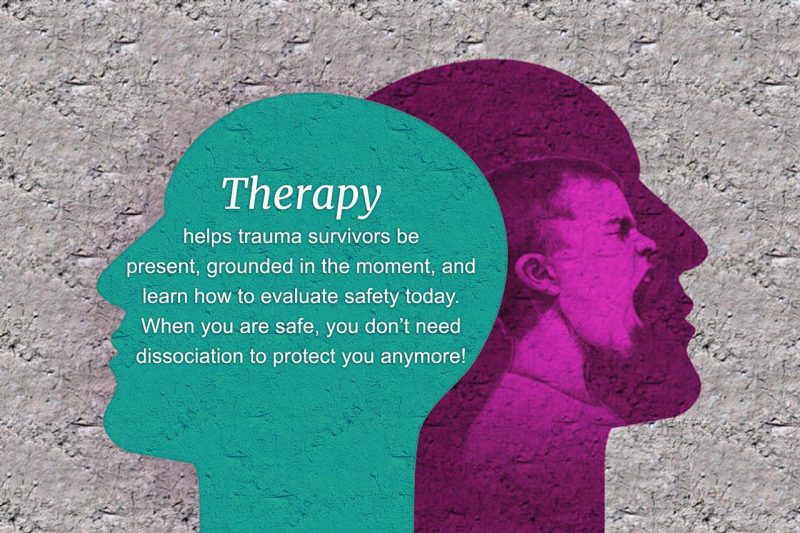Dissociation
All of us have experiences when we feel ‘disconnected’. It could be that we are having a conversation with someone but our mind is somewhere else, or we arrive at a destination with no recollection of driving there. For most of us, these moments are infrequent lapses that have no impact on our daily lives. However, for some people disconnecting from reality becomes a defence mechanism.
Being disconnected can quickly turn into dissociation. If left untreated, this can develop into a dissociative disorder. On this page, we will look at various effects of dissociation including the various disorders associated, such as dissociative identity disorder (DID).
What is dissociation?
The way we see the world around us is what defines our reality. Our thoughts, feelings and memories all contribute to help us know who we are and what is real. When these perceptions disconnect, our sense of reality and identity becomes distorted.
If someone is experiencing dissociation, he or she may look at themselves as if they are a stranger, unsure of who the person looking back at them in the mirror is, or indeed what is real. There are several mental health conditions that can cause dissociative symptoms including borderline personality disorder.
For some people though, dissociation is a form of extreme escapism. Escaping reality in a way that is involuntary and unhealthy, someone with a dissociative disorder may create alternative identities or suffer from amnesia.

Symptoms of dissociation
The effects of dissociation and dissociative disorders can be difficult to pinpoint and differ from person to person. It can affect the way you think, feel and behave – so it’s important to tell someone as soon as possible if you are experiencing the symptoms listed below.
The following symptoms are examples of what you may experience:
- feeling detached from your body
- experiencing gaps in your memory
- forgetting important information about yourself
- feeling as if there is more than one person inside of you
- hearing voices
- feeling as if the world around you isn’t real
- referring to yourself as ‘we’ rather than ‘I’
- having out-of-body experiences
- other people telling you that you have behaved out of character
- feeling detached from your emotions
- feeling numb or devoid of emotion
It can be very difficult to diagnose dissociation and dissociative disorders as many of the symptoms can be linked to other mental health issues. The very nature of the condition can also make the sufferer confused and reluctant to seek help, which may explain the low diagnosis rates. If you think you, or someone close to you, may be experiencing dissociative symptoms it is important to speak to your GP who can refer you to a mental health professional with experience in dissociation.
Dissociative disorders
Dissociative disorders occur when episodes of dissociation become regular and often. While cases of dissociation may be mild and go away in time, dissociative disorders tend to be more extreme and are likely to require ongoing treatment. The following are examples of dissociative disorders:
Dissociative amnesia
This happens when you are unable to remember key information about yourself or even a particular time in your life. With this disorder, you may also feel symptoms of depersonalisation and identity confusion.
Dissociative amnesia with fugue
A typical fugue may see you assuming an alternative identity for a certain period of time (this could be days or weeks). To those who don’t know you, your actions and behaviours may seem entirely normal. When the memory of your true identity returns, you may experience a range of different emotions including guilt, shame and depression.
Depersonalisation or derealisation disorder
This disorder leads you to feel detached from your own body and you may feel as if your body isn’t ‘real’. You may feel as if you are watching your body as if it was a movie, or you may have what feel like out-of-body experiences.
Dissociative identity disorder (DID)
One of the most complex disorders, dissociative identity disorder used to be known more commonly as multiple personality disorder. This name led people to believe that it is a personality disorder, but it is not (hence the name change). The overriding symptom of this disorder is change in identity.
Those with dissociative identity disorder may have a range of identities that are in control of the body and mind at different times. You are likely to experience severe amnesia and you may also experience symptoms of depersonalisation disorder. You may become aware of the other identities, or you may lose chunks of time without knowing why.
Other specified dissociative disorder (OSDD)
This is when you experience dissociative symptoms that don’t fit other diagnoses. If the person making your diagnosis can’t tell you why your symptoms don’t fit any other diagnosis, they may diagnose you with unspecified dissociative disorder (UDD).
Causes of dissociative disorders
As with many other mental health issues, the causes of dissociation are incredibly complex. Experts have agreed however that the most common cause for dissociative disorders is past trauma such as childhood abuse.
If you were abused as a young child, you may have ‘disconnected’ from yourself to cope with what was happening to you. Feeling vulnerable may have led you to use dissociation as a coping device, and this can continue even years after the abuse took place.
If there was no adult present to provide comfort, you may have had to become emotionally self-sufficient at a young age. As identity is still forming during this time, this can lead to confusion and the creation of other identities that can cope or escape from what is happening.
While it tends to be abuse that triggers dissociation, physical or emotional trauma as an adult can trigger a similar response.
Treatment for dissociative disorders
Treating dissociative disorders aims to re-connect you with your thoughts, feelings and memories to help you feel more real and complete as a person. If you suspect you have a dissociative disorder your first port of call should be your family doctor. They will be able to refer you to a mental health specialist who can go through your treatment options.
In terms of the treatment you may be offered, counselling to be likely to be at the forefront. Finding out the underlying cause of your dissociation is key, as is learning to recognise your symptoms and deal with stressful situations.
